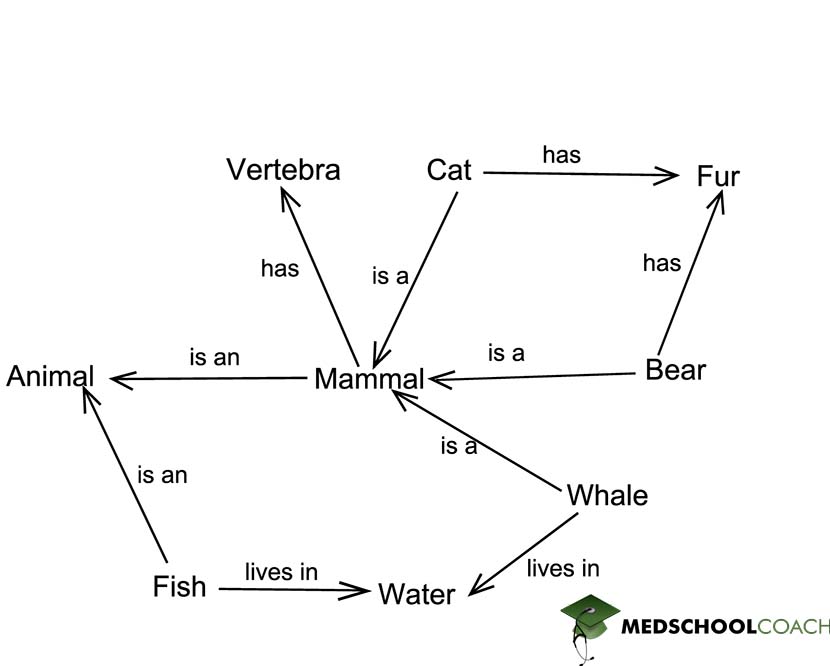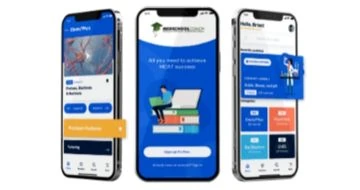Semantic Networks & Spreading Activation
MCAT Psychology - Chapter 2- Section 3 - Cognition - Memory
- Home
- »
- MCAT Masterclass
- »
- Psychological, Social, and Biological Foundations of Behavior
- »
- Psychology
- »
- Cognition
- »
- Memory
- »
- Semantic Networks & Spreading Activation – MCAT Psychology
Sample MCAT Question - Semantic Networks & Spreading Activation
What are semantic networks?
a) Knowledge bases that describe objects/concepts and their relationships
b) Network of nodes that represent relationships
c) Knowledge bases that describe objects/concepts and their characteristics
d) Network of lines that represent relationships
A is correct,
A semantic network is a knowledge base that describes objects/concepts and their relationships. Answer choice B is incorrect because semantic networks are networks of both nodes and lines. Furthermore, the nodes represent objects/concepts. Answer choice C is incorrect because semantic networks are knowledge bases that describes objects/concepts and their relationships, not their characteristics. Answer choice D is incorrect because semantic networks are networks of both nodes and lines. The lines represent semantic relations.
Get 1-on-1 MCAT Tutoring From a Specialist
With MCAT tutoring from MedSchoolCoach, we are committed to help you prepare, excel, and optimize your ideal score on the MCAT exam.
For each student we work with, we learn about their learning style, content knowledge, and goals. We match them with the most suitable tutor and conduct online sessions that make them feel as if they are in the classroom. Each session is recorded, plus with access to whiteboard notes. We focus on high-yield topics if you’re pressed for time. If you have more time or high-score goals, we meticulously cover the entire MCAT syllabus.
Semantic Networks & Spreading Activation for the MCAT
Semantic networks and spreading activation are two interconnected concepts that have greatly contributed to our understanding of how knowledge is organized and retrieved in the human mind. A semantic network is a graphical representation of interconnected concepts or nodes, where each node represents a concept, and the links between nodes represent relationships or associations between those concepts. Spreading activation, on the other hand, is a process within semantic networks wherein the activation of one concept spreads to related concepts, enhancing their accessibility and increasing the likelihood of their retrieval. Let’s review what you need to know about both these concepts for the MCAT.
Semantic Networks
Semantic networks are knowledge bases which describe the relationships between objects or concepts. Looking at Figure 1, nodes such as “Cat” and “Fur” represent objects or concepts. The lines between objects represent semantic relations, describing the connection between two objects.

Spreading Activation
Spreading activation is the theory of how information is retrieved from semantic networks. A node is going to be selected, and that node is going to activate another node via its semantic relation, and so on and so forth.
For example, if you prime a person with the word water, and then afterward ask them to name a mammal, they’re more likely to say whale than some other mammal. This likely occurs because, as you can see in Figure 1, the word water is semantically related to the word whale, such that when the node for water is activated, the node for whale is also activated, making a person more likely to think about whales.
The reliance of memory on semantic networks can sometimes result in errors. Let’s say that you have a situation where a list of dessert items is read to a group of people. The list will have words like cake, ice cream, chocolate, etc. The participants will then be asked to recite as many words on the list as possible. It is quite common that the participants will exhibit something known as intrusion errors, listing words that are not on the original list. Why does this occur? Perhaps the word cookie is semantically related to chocolate. When the word chocolate was processed, it may have activated the node for cookie via spreading activation, leading to participants thinking they remembered the word cookie being on the list.
Explore More MCAT Masterclass Chapters
Take a closer look at our entire MCAT Masterclass or explore our Biochemistry lessons below.

One-on-One Tutoring
Are you ready to take your MCAT performance to a whole new level? Work with our 99th-percentile MCAT tutors to boost your score by 12 points or more!
See if MCAT Tutoring can help me
Talk to our enrollment team about MCAT Tutoring

MCAT Go Audio Course
Engaging audio learning to take your MCAT learning on the go, any time, any where. You'll be on the way to a higher MCAT score no matter where you are. Listen to over 200+ lessons.

MCAT Practice Exams
Practice makes perfect! Our mock exams coupled with thorough explanations and in-depth analytics help students understand exactly where they stand.

MCAT Prep App
Access hundreds of MCAT videos to help you study and raise your exam score. Augment your learning with expert-created flashcards and a question banks.